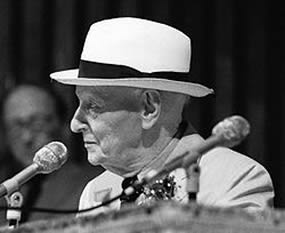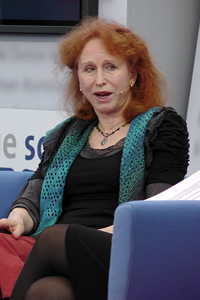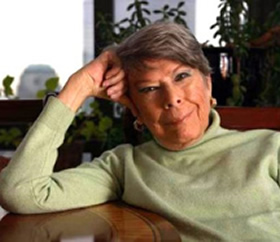|
De Amerikaans-Poolse schrijver Isaac Bashevis Singer werd geboren op 21 november 1904 als Isaac Hertz Singer in Radzymin, Polen. Zie ook alle tags voor Isaac Bashevis Singer op dit blog.
Uit: The slaughterer
Since Yoineh Meir had begun to slaughter, his thoughts were obsessed with living creatures. He grappled with all sorts of questions. Where did flies come from? Were they born out of their mother's womb or did they hatch from eggs? If all the flies died in winter, where in the new ones come from in the summer? And the owl that nested under the synagogue roof - what did it do when the frost came? Did it remain there? Did it fly away to warm countries? How could anything live in the burning frost, when it was scarcely possible to keep warm under the quilt?
An unfamiliar love welled up in Yoineh Meir for all that crawls and flies, breeds and swarms. Even the mouse - was it their fault that they were mice? What wrong does a mouse do? All it wants is a crumb of bread, a bit of cheese. Then why is the cat such an enemy to it?
Yoineh Meir rocked back and forth in the dark. The rabbi may be right. Man cannot and must not have more compassion than the Master of the universe. Yet he, Yoineh Meir, was sick with pity. How could one pray for life for the coming year, or for a favourable writ in Heaven, when one was for robbing others of the breath of life?
Yoineh Meir thought that the Messiah Himself could not redeem the world as long as injustice was done to beasts. By rights everything should rise from the dead: every calf, fish, gnat, butterfly. Even in the worm that crawls in the earth there glows a divine spark. When you slaughter a creature you slaughter God...

Isaac Bashevis Singer (21 november 1904 24 juli 1991)
De Nederlandse schrijfster Margriet de Moor werd als Margaretha Maria Antonetta Neefjes op 21 november 1941 in Noordwijk geboren. Zie ook alle tags voor Margriet de Moor op dit blog.
Uit: Eerst grijs dan wit dan blauw
In de week die voorafgaat aan Magda's terugkomst, slaapt hij onrustig en droomt hij zwaar. Op maandag schiet hij vlak voor zonsopgang overeind, hij bekijkt in het ochtendlicht zijn geopende vuisten en duikt onder de deken terug om te huilen. Toch herinnert hij zich een droom vol licht en warmte, met een Magda die door een vuurrood tulpenveld holt, een hond achter haar aan. Als ze aan de rand van een sloot blijft stilstaan, roept ze iets. Haar gezicht wordt groot, vrolijk en bol als op een foto die van te dichtbij is genomen. Op het moment dat hij wakker wordt, verandert dit alles, bliksemsnel, in radeloosheid...
... Als hij op vrijdag, aan het begin van de avond, de Oude Zeestraat inrijdt en in de bocht van de weg zijn huis ziet liggen, valt hem op dat de vaalrood gestreepte markiezen zijn neergelaten. Het zolderdakraam staat opengeklapt. In de voortuin beschrijft een watersproeier een doorzichtige acht boven de rozen. Ze is thuis.
Hij parkeert zijn auto op de oprijlaan, stapt uit en bukt zich om de kefhondjes te aaien, die vanuit het huis op hem af zijn gestoven. Het is de hele dag erg warm geweest, ineens voelt hij de vochtplekken op zijn overhemd. Kalm. Kalm nou maar, jongens. Hij krauwt de vacht op de koppen, onder de bekken, tussen de poten, tot de diertjes, ongeduriger dan hij, weer van hem wegspringen. Een volgend ogenblik staat hij op de drempel van de keuken. Daar hebben we Magda.
Ze zegt: Wat denk je, zullen we maar buiten eten ondanks dat het er stikt van de wespen?
Ze staat bij de gootsteen haar handen af te spoelen. Ze lacht naar hem over haar schouder. Ze komt in een lucht van knoflook en gebraden vlees op hem af.

Margriet de Moor (Noordwijk, 21 november 1941)
De Amerikaanse schrijfster en literatuurwetenschapster Marilyn French werd geboren op 21 november 1929 in New York. Zie ook alle tags voor Marilyn French op dit blog.
Uit: Shakerspeare's Division of Experience (Othello)
Nowhere in Shakespeare are relations between males and females more searchingly, painfully probed. Othello is the last play in which this occurs; with it, the concerns that are central in Comedy of Errors, Taming, Much Ado, and All's Well are finally laid to rest.
The dominant culture of the play is that of Venice, which is shown here as similar to the Venice of Merchant, but in a more positive light. Venice is worldly, powerful, moneyed, and mannered. It is not just a place but an influence, and its mores are implanted in all the characters, even in those who, like Othello and Cassio, are not native Venetians. Venice is civilization, a civilization the characters carry with them to primitive, wild, wartorn Cyprus. The graft is as uneasy as the overlay of civility on any basic human core.
The scenes in Venice present the masculine principle in two aspects. The Senate scene shows it at its finest, possessed of honor, lawfulness, decorum, knowledge, and power, yet 'feminine' in its protective and consolatory inclinations. The city is dominated by reason, and the council scene (I, iii) exemplifies reason in action, whether the issue is a set of conflicting reports of an enemy's movements or a father's hysterical attack. Reason is a form of control, and it is control above all that is the ideal of this culture. Control is essential to a culture which views natural humanity as depraved and vicious: thus Hamlet values Horatio, and Polonius lectures Laertes. It is also essential to a culture which views natural humanity as bestial and voracious, which is closer to the view of this play. The shocked Lodovico laments:
Is this the noble Moor whom our full Senate
Call all in all sufficient? Is this the nature
Whom passion could not shake? whose solid virtue
The shot of accident nor dart of chance
Could neither graze nor pierce?
(IV, i, 264-8)

Marilyn French (New York, 21 november 1929 2 mei 2009)
Zie voor nog meer schrijvers van de 21e november ook mijn blog van 21 november 2011 deel 1 en eveneens deel 2.
21-11-2012 om 19:23
geschreven door Romenu 
Tags:Isaac Bashevis Singer, Margriet de Moor, Marilyn French, Romenu
|

